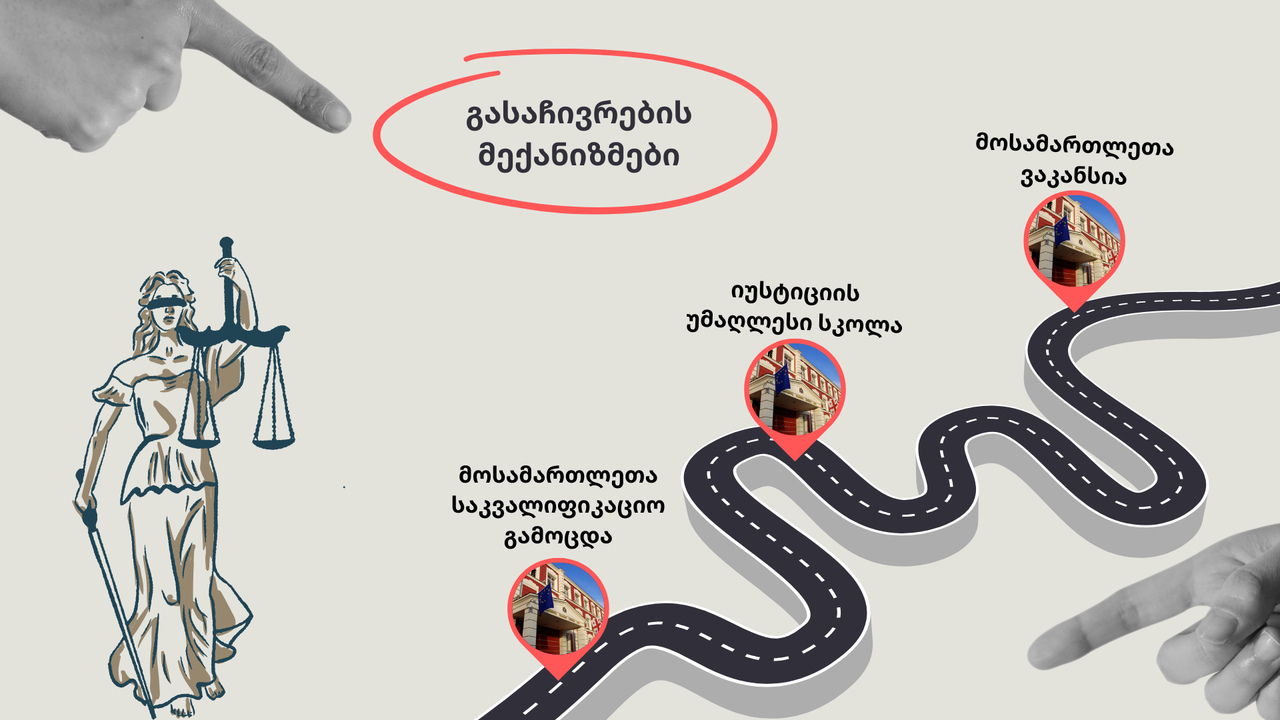Appeal Options on the Judicial Journey

As the statistics show, the High Council of Justice maintains the status of an invincible side in legal disputes. During 2017-2022, 14 cases have been submitted against the High Council of Justice to the Supreme Court Qualifications Chamber, which considers disputes related to the appointment of judges. The Qualifications Chamber refused to accept 4 applications in the proceedings, did not satisfy the request in 5 cases, refused to accept 1 application in the proceedings, and redirected 1 case to the Administrative Chamber of Tbilisi city court for review.
The issue of the appeal tools during the selection process of judges in the judicial system has been part of the reports and recommendations of internal as well as international organizations for years.
On 14th of December, the European Council granted Georgia the EU candidate status, meaning that Georgia shall carry out several reforms next year, obviously, including judicial reform. According to the European Commission evaluation, published on 8th of November 2023, despite the judicial reforms carried out, the changes did not affect a number of issues, introducing efficient appeal tool in the process of selecting judicial candidates among them.
Venice Commission also issued recommendations on the appeal mechanisms several times. Topics are diverse and include the appeal system in the process of selecting judicial candidates, as well as transfer/secondment of judges, or imposing disciplinary measures. For example:
Opinion N°773/2014 of 14th of October 2014
- Appeal against decisions of the High Council of Justice refusing appointments. The draft provision gives a right to an “interested person” to challenge the decision on refusing the appointment. [...] However, the draft provision seems to be narrow and excludes the possibility of the unsuccessful candidate to challenge the decision to select another – successful- candidate.
- The judge shall have an opportunity to appeal the decision on the appointment/secondment to another court.
Opinion N°937 / 2018 of 17th December 2018
- Venice Commission mentioned: It is to be welcomed that the decisions of the HCJ in disciplinary matters may be appealed to the Disciplinary Chamber of the Supreme Court.
Opinion N°1001/2020 of 8th October 2020
- Although the Qualifications Chamber of the Supreme Court has the right to annul the initial decision of the High Council of Justice, it cannot appeal the second decision. As the Commission assessed that the absence of the appeal mechanism will empower the same composition of the HCoJ to maintain its original decision, even if the decision was biased or discriminated against a candidate, or violated a candidate’s rights, or jeopardized judicial independence, or flawed. Therefore, the Commission recommends that the Qualifications chamber has the right to appeal the second decision of the High Council of Justice.
Having effective appeal mechanisms contributes to the legitimization of trust and decisions made. Parallel to the challenges to the judicial system, lack of public trust towards the judiciary and concentration of power in the hands of HCoJ, the availability of appeal mechanisms has even more significance for the judges and those pursuing the position of a judge. Accordingly, it is very interesting what are the decisions that can be appealed nowadays by a person on a judicial journey, on one hand, and by a judge, on another. At this stage, we will focus on the first part and review the stages a person undergoes on a judicial journey and what are the decisions they are entitled by the law to appeal.
Stage 1 – Passing judicial qualification exam
According to the Organic Law on Common Courts, all persons wishing to be elected to the position of a judge shall pass the qualification exam, unless otherwise stated by the law.
In the process, the power is mostly concentrated in the hands of the High Council of Justice, as it determines the procedure for conducting the exam, the program of the qualification exam and the participation fee for the exam. The Council also created a qualification exam committee, in order to evaluate the results of the qualification exam.
The exam itself consists of two stages. a test and a written exam. The maximum score of the test is 100 points. Test is considered as passed if the examinee scores 75 points or more. Only after successfully passing the test the examinee is eligible for the written exam. The maximum score for the exam is 25 points. It is considered as passed if the examinee scores 15 points or more.
During 2015-2023, only 267 persons out of a total of 1443 examinees passed the qualification exam. Accordingly, we can say that the exam passing rate is quite low, at 18%. With these statistics on the background, the appeal mechanism may appear even more important and efficient.
According to the High Council of Justice Decision on the Procedure for Conducting the Judicial Qualifications Exam and the Approval of the Qualifications Exam Program, appealing the exam results is possible.
An appeal group is formed to review the results of the qualifications (test and written). The composition of the appeal group is selected from the exam committee members by the chairman of the examination committee. The exam committee itself is formed by the HCoJ, with a composition of 20 members.
An examinee not satisfied with the result of the test and written exam has the right to address the appeal group and request a review of the results. An appeal is accepted within 2 days from announcing the results. A review of the test exam is possible if the examinee has accumulated at least 70 points, and, in the case of writer exam – at least 10 points.
The appeal group consists of 5 members and its composition is anonymous. Mutual anonymity is guaranteed during the review of the appeal. After reviewing the application, the final assessment is recorded in the journal and confirmed by the signature of the chairman of the exam committee.
Stage 2 – High School of Justice
One of the requirements a person wishing to become a judge shall meet is completion of the full course of the High School of Justice. Thus, once successfully passing qualification exams, next mandatory step for the applicant is attendance and successful completion of the School course.
On the other hand, according to the statute of the High School of Justice, the purpose of the school is the professional training of a person to be appointed as a judge in the system of General Courts of Georgia - a trainee of justice. As in case of conducting the qualifications exam, power of the High Council of Justice is well felt at this stage too, also reflected by the role of the High Council of Justice in the process of staffing school management bodies.
School management bodies are the School Independent Council and School Directorate. The Independent Council consists of 7 members, 3 out of which is selected during the Conference of Judges, and 4 members are appointed by the High Council of Justice. The Independent Council determines the main directions of the school, and coordinates and supervises their execution. The School Directorate is responsible for everyday school activities. It ensures that decisions of the Independent Council are executed, plans and implements learning, internship and training programs, as well as carries out other activities set by the law.
As for the admission to school, a person becomes a trainee of justice through public contest. The decision to hold the contest is taken by the HCoJ.
The first stage of admission to school registration of candidates is when the Independent Council checks compliance of the documentation submitted by the candidate with the requirements. If a candidate does not meet contest requirements, the Independent Council takes decision on refusing registration. Independent Council holds interviews on the closed session with each candidate progressing to the second stage. A candidate is enlisted as a trainee of justice if voted by at least half of the Council members. However, this is just the enlistment followed by the learning process. The learning process lasts for 16 months and covers theoretical course, internship, and seminar work.
I – Upon completion of the theoretical course, a trainee takes the final exam conducted into two parts – test and verbal. The maximum score of the test is 70 points. Test is considered as passed if the examinee scores at least 50 points. The maximum score for the verbal exam is 30 points. It is considered as passed if examinee scores 20 points or more.
II – After passing theoretical and verbal exams, a trainee starts an internship. The internship coordinator grades the work performed by the justice trainee daily and keeps an evaluation journal in a form approved by the school principal. The justice trainee is evaluated with a single-grade system. The internship is considered successfully completed if a trainee accumulates at least 2/3 of the maximum points available.
III – the last stage for the school trainee is seminar work. After completion of this stage, a trainee takes the final exam. The maximum score of the final exam is 100 points. The exam is considered as passed if the examinee scores at least 85 points.
Therefore, enlistment in the school, as well as learning process and successful completion is a long process consisting of several stages and exams. According to the HCoJ statute, a trainee has right to appeal the results of a theoretical course and final exams of the High School of Justice.
The results of the test can be revised if a trainee accumulates at least 45 points. Revision of the verbal exam is possible if the examinee scores less than 20 points. The final exam of the High School of Justice can be revised if at least 80 points are scored.
As for the review of the appeal, points are revised by the Appeals Committee. Composition of the Appeals Committee is anonymous and consists of at least 3 members. Principle of mutual anonymity is followed when the appeal is reviewed by the Appeals Committee, except when revising verbal exam results.
Stage 3 - Procedure for holding the position of a judge and appeal mechanisms
Participation in the contest announced for the vacant position of a judge is the next step after successful completion of the judicial Qualifications exam and High School of Justice. Naturally, similar to the steps to be taken on a judicial journey, power and influence are largely in the hands of the High Council of Justice in this case too. Until the occurrence of a vacant position of a district (city) or appellate court judge, the High Council of Justice announces a contest and leads an appointment procedure for a judge of the mentioned court. A person is appointed as a judge for 3-year probation period, by the High Council of Justice, with the decision of at least 2/3 of its full composition.
In case of refusal to appoint to the position, the Organic Law envisages the opportunity of an appeal. the Chamber of Qualification of the Supreme Court reviews the appeal on the decree/decision of the High Council of Georgia taken during the process of assigning a person to the position of the district (city) of appellate court for 3-year probation period or for life, including the decree/submission of the HCoJ taken during the process of selecting candidates for the position of a Supreme court judge, to present to the Parliament of Georgia.
A candidate for judge may appeal the decision of the High Council of Justice of Georgia on refusing to assign him/her to the position of a judge for life to the Qualifications Chamber of the Supreme Court if he/she considers that:
- Member(s) of the High Council of Justice of Georgia was/were biased during the competition;
- The attitude of member(s) of the High Council of Justice of Georgia was discriminatory;
- Member(s) of the High Council of Justice of Georgia exceeded his/her/their powers under the legislation of Georgia, which resulted in violation of rights of the candidate for judge, or threatening the independence of the judiciary;
- The information that served as a basis for this decision is substantially false, in proof of which the candidate for judge has presented the appropriate evidence;
- The competition was conducted in violation of the procedure established by the legislation of Georgia, which could substantially affect the final result.
The decision of the Qualifications Chamber of the Supreme Court is final and may not be appealed. If the Qualifications Chamber of the Supreme Court thinks that the decision of the High Council of Justice shall be annulled, it is sent back to the Council for revision of the lifetime appointment of a person to the position of a judge. If after revision, the Council still refuses to appoint a person to a position of a judge, a candidate may appeal the Council decision to the Qualifications Chamber for the second time.
Appeal tools on the judicial journey is like an enchanted circle swayed by the power of the High Council of Justice. Notwithstanding the fact that the bodies revising the appeals shall be independent and unbiased, the influences and role of the High Council of Justice in the formation process of the appeal bodies leave less expectations for full independence and impartiality.
But maybe these expectations are completely inappropriate, and the appeal mechanism is really effective? We may prefer to look for the answers in numbers. For example, During 2012-2022, the High Council of Justice was a party in 33 administrative disputes; Along with other topics, the disputes were on the admission to the High School of Justice, the qualification examination for judges, and the competition for judges. All disputes, except for a single one, were resolved in favor of the HCoJ. As mentioned in the beginning, the picture does not change in case of revisions by the Qualifications Chamber. Usually, cases in the Qualifications Chamber are resolved in favor of the High Council of Justice, raising a question: despite legislative changes (that still need to be refined) what has changed for those wishing to become a judge?
Nowadays, there are more than 100 vacancies in the judiciary, however, as seen from monitoring of the judicial contests, the number of people wishing to become a judge is very low. In our opinion, on of the reasons for this is that a person wishing to become a judge does not have relevant levers to effectively defend his/her interests by legal means. Accordingly, to what extent the appeal mechanisms exist is one thing, and the real effectiveness of the appeal tools – is another.
---
Materials published on Courtwatch.ge is a property of Georgian Court Watch and, when using them, “Georgian Court Watch” shall be indicated as a source.


































